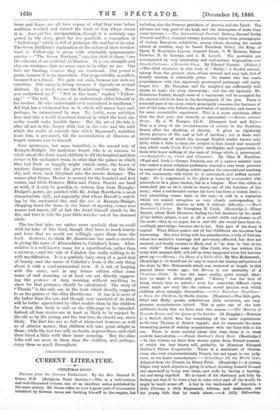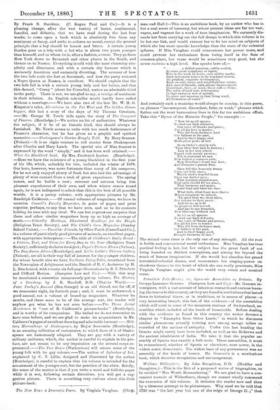CURRENT LITERATURE.
CHRISTMAS BOOKS.
Pictures from the German Fatherland. By the Rev. Samuel G. Green, D.D. (Religious Tract Society.)—This is a well-written and well-illustrated volume, one of an excellent series published by the same society. Dr. Green takes us over a great part of the country inhabited by German races, not limiting himself to the empire, but including also the German provinces of Austria and the Tyrol. The pictures are very good of the kind, and the letterpress of more than usual interest.—The International Portrait Gallery, Second Series (Cassell and Co.), contains twenty portraits taken from photographs of various European celebrities, among whom, choosing the names almost at random, may be found President Grevy, the King of Spain, M. Hyacinthe Loyson, General Grant, 0. W. Holmes, Signor Castelar, M. de Lesseps, and J. R. Lowell. The portraits are accompanied by very interesting and well-written biographies.— Family Fortunes : a Domestic Story. By Edward Garrett. (Nelson.) —The chief character in this book is " Darby," a Scotch servant, sprung from the peasant class, whose shrewd and racy talk, full of homely wisdom, is admirably given. No reader who has made acquaintance with this vigorously pourtrayed personage will easily forget her. Mr. Farquhar and his daughter are sufficiently well drawn to make the story interesting ; and the old bachelor, Mr. Demetrius Turner, though more of a caricature, will be accepted for the service which he does in the development of the plot. There is a second part of the story, which principally concerns the fortunes of one of the sons, who follows the profession of medicine, and comes in for some remarkable experience. This is a more ambitious effort than the first part, but scarcely so successful.—Bricks without Straw. By A. W. Tonrgee, LL.D. (Sampson Low and Co.)— This is a story of the reconstruction of society in the Southern States after the abolition of slavery. It gives ns vigorously drawn pictures of life, and is full of incident ; but it deals with social conditions of which the average English reader knows very little, while it fails to treat the subject in that broad and masterly way which made Uncle Tom's Cabin intelligible and appreciable to those who know nothing of the state of things which it pourtrayed. —Rudyford ; or, Creed and Character. By Silas K. Hawkins. (Ward and Lock.)—George Tremain, son of a narrow-minded- man who makes a stern religious profession conceal a very loose practice in respect of honest dealing, rebels against the conventional teaching of the community with which he is associated, and suffers accord- ingly. He is supplanted in his place at home by a scoundrel who pretends to be a pious banker, but is a burglar. How this villain is unmasked just as he is about to marry one of the heroines of the story ; what a hairbreadth escape the hero has from a violent death ; how everything comes right at the end,—is told in a narrative which we cannot recognise as very closely corresponding to reality, but which carries us with it without difficulty.—Mark Dennison's Charge. By Georgiana M. Craik. (Routledge.)—Elinor Bertini, whom Mark Dennison, finding her left destitute by the death of her father, adopts, is not at all a model child, and pleases us all the more—that is, on paper, for in real life she would have been ex- ceedingly provoking—because she is not. This part of the story is capital. When Elinor passes out of her childhood, she becomes less interesting. She tries living with her grandmother, a lady of fortune, whom her mother's marriage had grievously offended, but does not succeed, and finally returns to Mark, and is "as dear to him as his own child." Perhaps some day Miss Craik, who has written this story with unusual skill, will tell us what happened when her heroine grew up.—Hermy : the Story of a Little Girl. By Mrs. Molesworth. (Routledge.)—It would not be easy to match the beauty and pathos of the story by Mrs. Molesworth which was reviewed at length in this journal three weeks ago ; but Hermy is not unworthy of A Christian Child. It has the same reality, quite enough ideal- ised, to make it artistically good. " Hermy " has the look of being closely true to nature ; even her somewhat difficult views about truth are very like the curious moral puzzles with which children often entangle themselves.—Our Next-door Neighbour : a Story for Children, by Stella Austin. (Masters.)—The little girls, Sibyl and Molly, quaint, mischievous little creatures, are very pleasant acquaintances indeed. This is quite one of the best children's books that we have seen this season.—The History of Tommie Brown and the Queen of the Fairies. (D. Douglas.)—Tommie is a Scotch child, who has something of the same experiences as the true Thomas of Scotch legend ; and he transmits the same interesting power of making acquaintance with the fairy-folk to his son. There is more novelty about this than there is in most modern fairy-stories.—Prince Darling's Story Book. (Routledge.) —In this volume we have four stories taken from French sources, of which the best known will, probably, be Monsieur Edouard Ourliac's Prince Coqueluche. There is a multitude of illustra- tions, also very characteristically French, but not equal, in our judg- ment, to our home manufacture.—Schoolboys all the World Over. Adapted from the French, by Henry Frith. (Routledge.)—A certain Edgar very much objects to going to school, thinking himself ill-used and oppressed by being sent there, and ends by having a barring- out and being expelled. He is cured of his obstinacy and folly by finding out that if he were a boy in some other part of the world, he might be much worse off. A boy in the backwoods of America, a little Chinese, a little Esquimaux, African, and Australian, are the young folk that he reads about. —21 Jolly Fellowship. By Frank R. Stockton. (C. Began Paul and Co.)—It is a pleasing change, after the vast variety of books, sentimental, fanciful, and didactic, that we have read during the last four weeks, to come upon a book which is absolutely free from any sentiment or fancy, and seeks to enforce no moral, except the general principle that a boy should be honest and brave. A certain young Gordon goes on a trip with a -lad who is about two years younger than himself, and to whom he is, after a fashion, a tutor. They go from New York down to Savannah and other places in the South, and thence on to Nassau. Everything is told with the most charming sim- plicity and directness, and with a certain dry humour which is eminently American and eminently diverting. The account of how the two lads scale the fort at Savannah, and how the party restored a Negro Queen at Nassau, is excellent. We should explain that the two lads fall in with a certain young lady and her father, and that this damsel, " Corny " (short for Cornelia), makes an admirable third to the party. There is not, we are glad to say, a vestige of sentiment in their relation. An English tale-teller would hardly have ended without a marriage.—We have also two of the late Mr. W. H. G. Kingston's tales, Adventures in the Far West and The Golden Grass- hopper, this last a story of the days of Sir Thomas Gresham. —Mr. George M. Towle tells again the story of The Conquest of Pizarro. (Routledge.)—We notice no list of authorities. Whatever the subject, if it be of an historic kind, this should always be furnished. Mr. Towle seems to write with too much forbearance of Pizarro's character, but he has given us a graphic and spirited narrative.—Shakespeare's Stories Simply Told. By Mary Seamer. (Nelson).—It is no slight venture to tell stories from Shakespeare after Charles and Mary Lamb. The special aim of Miss Seamer is expressed by the word " simply," and it has been well attained.— What the Blackbird Said. By Mrs. Frederick Locker. (Routledge). —Here we have the existence of a young blackbird in the first year of his life, which, unluckily for him, included the winter of 1878. Our hero, however, was more fortunate than many of his compeers, for he not only enjoyed plenty of food, but also had the advantage of plenty of wise counsel from a rook of great experience. The spring comes, and he builds a nest; summer and autumn bring him pleasant experiences of their own, and when winter comes round again, he is not indisposed to admit that this is the beat of all possible worlds. It is a pretty volume, with appropriate pictures by Mr. Randolph Caldecott.—Of annual volumes of magazines, we have to mention Cassell's Family Magazine, in point of paper and print superior, perhaps, to any that we have seen, and as to its contents holding its own with any rival. We can but express our surprise that these and other similar magazines keep up so high an average of merit.—Friendly Meetings, Illustrated Readings for the People (Religious Tract Society), and The Child's Own Magazine (Sunday School Union).—Familiar Friends, by Olive Patch (Cassell and Co.), is a volume of particularly good pictures of animals, on excellent paper, with appropriate letterpress.—The title of Children's Daily Bread : a Picture, Text, and Verse for Every Day in the Year (Religious Tract Society), sufficiently declares its object; Papa's Picture Album (Nelson), The Day-Dawn Album (Routledge), and Little Lottie's Picture Gallery (Nelson), are all in their way full of interest for the younger children, for whose benefit also we have Northern Fairy-Tales, translated from the Norwegian of Asbjfirusen and the Danish of H. C. Andersen by H. L. Bracksteed, with twenty-six full-page illustrations by R. T. Pritchett and Clifford Merton. (Sampson Low and Co.)—With this may be mentioned a somewhat sumptuously got-up volume, The History of a Dewdrop, by J. R. Macduff, D.D. (Marcus Ward). Peter Parley's Annual (Ben George) is an old friend, not far off, if we remember right, its fortieth year ; and, it must be understood, a good annual, not a volume of bound-up magazines. Whatever its merits, and these seem to be of the average sort, the reader will anyhow get what he has not seen before.—The Three Jovial Huntsmen is " one of R. Caldecott's picture-books" (Routledgc), and is worthy of its companions. The ballad we do not remember to have seen before, and we are glad to make its acquaintance in Mr. Caldeoott's pages of excellent drawing and admirable hamour.—Miii- tary Misreadings of Shakespeare, by Major Seccombe (Routledge), is an amusing collection of caricatures, to which lines of it of Shake- speare are humorously adapted. They are gay with a variety of military uniforms, which, the author is careful to explain in his pre- face, are not meant to be any imputation en the several corps re- presented.—The Two Bears (Watherston) will amuse some of the young folk with its gay colours.—The author of Splashes of Ink, explained by C. T. Lillie, designed and illustrated by the author (Routledge), is careful to explain that his volume is intended for the amusement of the younger sort, but the practice of the elder. Briefly, the sense of the matter is that if you write a word and fold the paper while it is wet, following certain directions, you will get a sug- gestive picture. There is something very curious about this little picture-book.







































 Previous page
Previous page